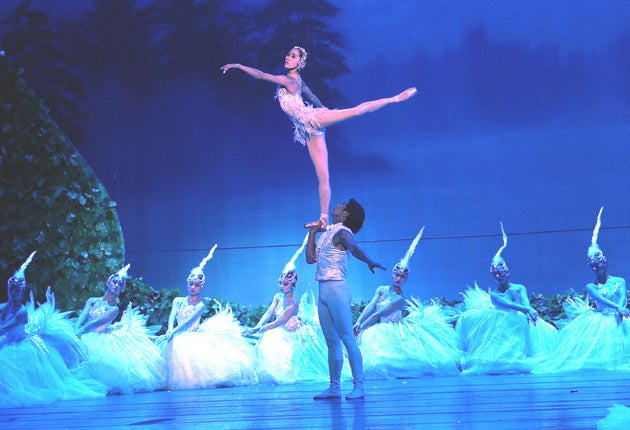China's great leap forward
Ballet was a restricted art form in the country of their childhood. Now, older Chinese women are making up for lost time. Clifford Coonan reports

After a few minutes spent tying on her ballet shoes and stretching her legs on the barre, Liu Ping bends her knees delicately, then executes a perfect pirouette, as her stern, protective teacher sounds out the numbers for the exercise.
Her face is a picture of modesty as she carefully raises her arm and completes a graceful pas. Next, she does a series of pliés, while her friends in the ballet class, gathered around the barre, smile and practise the same steps.
The movements are challenging, and for a flexible 10-year-old girl whose muscles remain unravaged by the passage of time, they would be difficult enough. But Liu Ping is not a 10-year-old tyro: she is a 59-year-old retired property developer.
In Britain, ballet classes are generally the domain of young girls but in China, ballet is becoming a pastime of choice for the middle-aged. "I can't say which part of ballet I like best. I like it all. I like the exercise, and I like the graceful, classical elegance of it all. I've been coming here for 10 years now and I always look forward to my class," said Liu, from Beijing, who is the oldest member of the Liqun ballet company, which caters for older women who want to do ballet.
Dressed in her green singlet and legwarmers, she looks every inch the ballerina. And despite her and her fellow dancers' creaking limbs, their enthusiasm for this Western tradition is palpable.
China's older generation likes to keep fit. Public parks have special exercise machines catering for older people. An early stroll through the same parks reveals grey-haired men and women doing tai-chi, walking backwards and jogging slowly while beating their chests softly, all activities believed to help keep you active and well. Some care facilities use ballet with their senior residents to help their co-ordination and self-esteem.
At night, hundreds of older couples often waltz down by Houhai lake, not far from the Forbidden City. But for sheer elegance, it's hard to beat the ballet school.
China may not seem like a natural home for ballet. The Maoist doctrine that long governed the country hardly seems to have a place for the art form's focus on the individual. But it was under Chairman Mao that the National Ballet company was established. While its repertoire was somewhat hampered in the days of the Cultural Revolution, it has broadened since. These ballet classes are emblematic of China's modernisation over the past 30 years of reform.
To get to the class, you climb five flights of exterior stairs in the Beijing Post Office Worker Culture Centre, then enter a hall lined with portraits of revolutionary leaders and photographs of model workers and sporting heroes from the post office, where preparations are taking place for the 60th anniversary of the revolution that brought the Communist Party to power. Stirring music plays through old box speakers on the wall.
The lessons are held in a studio at the back of the hall. This class opens with a Chopin nocturne.
Ballet schools for older people can be found across China. The Xiyanghong Ballet Company at Liaoning Art University for Senior Citizens in Shenyang, in the north-east, has 14 women aged from 50 to 62 among its members. Jacqueline and Jill, who insist on using their English names, are a mother and daughter who have been coming to the class for years.
Jill is 16 and the youngest member of the troupe. Jacqueline, who works in an office affiliated with the Ministry of Culture, says her age is a secret. "It's all fun, I don't know which part I like best," says Jill as she stretches her leg on the barre, a little easier for her than for some of the others. According to their teacher, the standard is very high.
Liu Liqun, reverentially referred to as 'laoshi' ('teacher'), is a graduate of the Beijing Dance Academy and a former member of the National Ballet. He proudly tells of how he even got to travel abroad in the old days and was supposed to go to Britain but was forced to return to China in 1971 after the death in an air crash of the army commander Lin Biao – an event that was officially cited as an accident but which most people believe was Mao's doing.
Mr Liu founded the first woman's aerobics team in China in 1985, but his first love is ballet. "My main aim is to keep it tasteful, to do it right," he says. "The students are very committed, and they adapt well to the discipline needed to perform ballet well."
Mr Liu has run the school for 10 years and says the post office studio room is only temporary while his main facility is being finished.
"The women are very graceful," he says, as he changes a CD and starts putting his students through the next round of movements. There is good humour in evidence, but also real grace. The women are not self-conscious and seem to anticipate many of Mr Liu's commands.
He walks through the room, lifting one woman's arm and straightening the posture of another, although he has no need to interfere with the movements of his oldest pupil. With great hauteur, Jiu grasps the barre and performs a stylish plié.
"Perfect, really perfect," he says. Whatever the age of the participants, there seems little question of any of them running out of steam.
Join our commenting forum
Join thought-provoking conversations, follow other Independent readers and see their replies
Comments